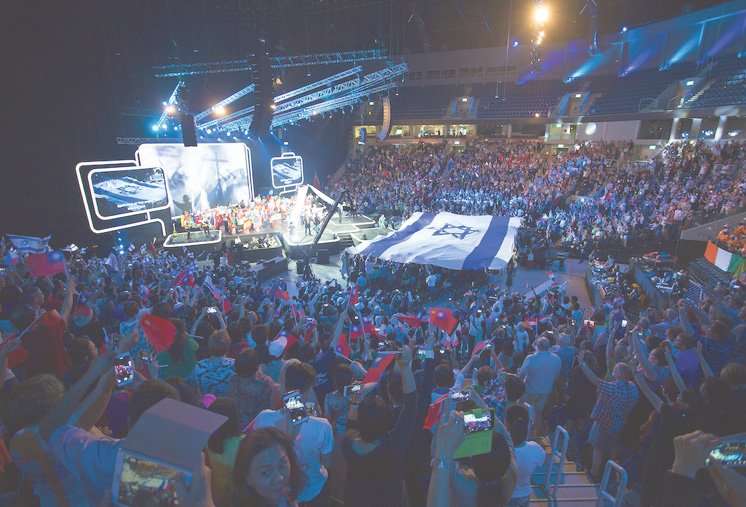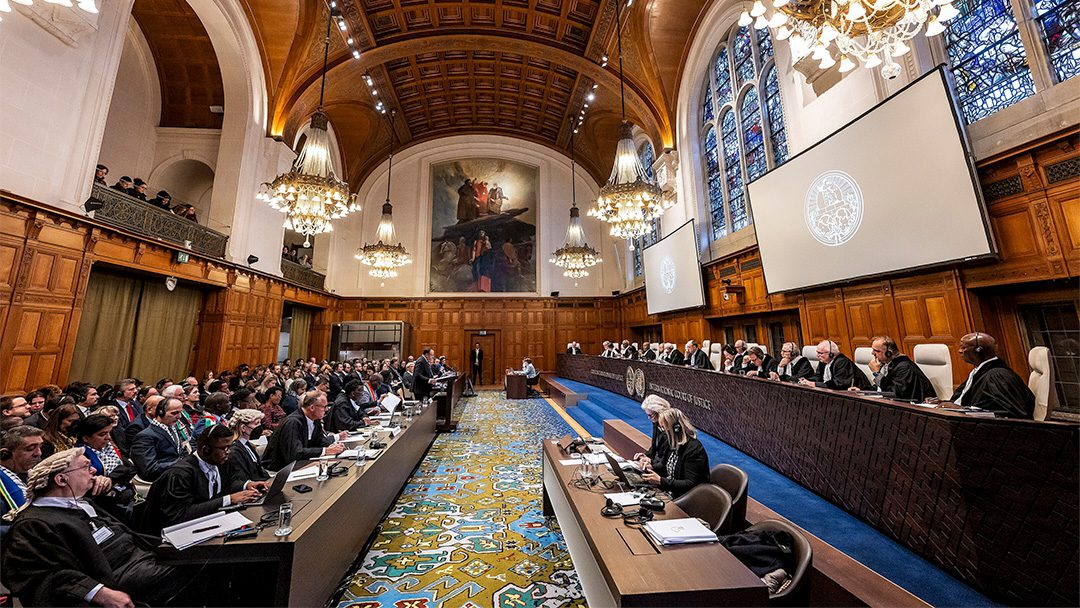Recently the International Christian Embassy of Jerusalem (ICEJ) moved their international headquarters from Jerusalem to the nearby Talpiyot business district. The move is temporary until a more permanent home can be secured in Jerusalem.
For the past forty years ICEJ has worked to bring comfort and support to Israel and the Jewish people.
An article published in 1993 summed up the ICEJ goals:
To show concern for the Jewish people and the reborn State of Israel, by being a focus of comfort.
To be a centre where Christians can gain a biblical understanding of Israel, and learn to be rightly related to the nation.
To present to Christians a true understanding of what is taking place in the Land today so that world events may be interpreted in the light of God’s Word.
To remind and encourage Christians to pray for Jerusalem and the Land of Israel.
To stimulate Christian leaders, churches and organisations to become effective influences in their countries on behalf of the Jewish people.
To encourage Jewish people to return to their homeland.
To be a channel of fulfilment of God’s promise that one day Israel and her Arab neighbours will live in peace under the blessing of God, in the middle of the earth.
To begin or assist projects in Israel, including economic ventures, for the well being of all who live here.
To take part through these activities in preparing the way of the Lord and to anticipate His reign from Jerusalem.
ICEJ was formed in September 1980. Local Christians already celebrated the Feast of Tabernacles (Leviticus 23:33-44).
In 1980 they were joined by more than a thousand Christians who came from 40 nations. In that year the Israeli parliament declared the city of Jerusalem to be the undivided, eternal capital of the State of Israel, an edict established by King David 3000 years earlier.
Protest around the world was immediate. An Arab oil embargo was threatened and thirteen embassies moved out of Jerusalem and relocated to Tel Aviv. By the end of their week-long festival these bold pioneers decided to open a ‘Christian Embassy’ in Jerusalem. This was an act of comfort and solidarity with the Jewish nation and the people in their ancient claim and connection to the Holy City. Their decision flew in the face of the angst towards Israel.
What moments highlight the ICEJ history?
In 1982, the ICEJ organized one of the first media tours of Lebanon for the foreign press corps in Jerusalem in the wake of Operation Peace for Galilee.
In 1985, the ICEJ organized sponsored the first of four International Christian Zionist Congresses, with the initial one held in Basel, Switzerland in the same venue as the original Zionist Congress of 1897.
In 1986, the ICEJ began sponsoring efforts to assist persecuted Jews leaving the Soviet Union for Israel via Budapest and Vienna. For the next two decades, the ICEJ’s Wallenberg Center in Budapest operated as a key respite and transit point for Soviet Jews on their way to Israel.
After the fall of the Iron Curtain in late 1989, the ICEJ began sponsoring charter flights for tens of thousands of Russian-speaking Jews bound for Israel. Among the aliyah routes pioneered by the ICEJ in the early years of the mass Soviet Jewish emigration, thousands of Jews came through Helsinki, often staying in the homes of Finnish Christians before flying on to Israel.
After Israel brought thousands of Ethiopian Jews home in an emergency airlift in May 1990, the ICEJ began operating the first ever mobile medical clinics in Israel to treat these new immigrants as well as many Bedouin communities for various diseases.
In 1991, the ICEJ was first on the scene with aid for the 5,000 Israeli civilians in Ramat Gan who were left homeless when Iraqi Scuds were falling in the Tel Aviv area during the First Gulf War.
In May 1997, the ICEJ moved its global headquarters to the landmark building at 20 Rachel Imeinu in the German Colony neighborhood of Jerusalem.
In September 2000, the ICEJ presented to Israeli leaders results of a global petition which garnered signatures and endorsements representing the support of millions of Christians worldwide to keep Jerusalem united and under Israeli sovereignty.
In 2002, the ICEJ donated an armored school bus to the community of Efrat to protect students from terror threats, in just one example of emergency assistance to Israelis during the violent Second Palestinian Intifada.
The Christian Embassy also sponsored tours in Israel and the nations of the musical drama The Covenant, a production which proved to be very encouraging to the tens of thousands of Israelis during the darkest days of the second intifada.
In 2004, the ICEJ was closely involved as a founding honorary member in the launch of the Knesset Christian Allies’ Caucus.
In 2005, the ICEJ entered an official partnership with Yad Vashem to establish a Christian Desk at this revered Israeli institution and to open up the Christian world to Yad Vashem’s message on the universal lessons of the Holocaust.
In 2005/06, the ICEJ provided special assistance to hundreds of Israeli families evacuated from Gaza during the Disengagement, most notably by building playgrounds for children in the new communities where the evacuees were housed.
In September 2008, the International Christian Embassy Jerusalem delivered a global petition to United Nations Secretary General Ban Ki-moon signed by over 55,000 Christians from more than 120 countries worldwide demanding that Iranian President Mahmoud Ahmadinejad be indicted for incitement to genocide against Israel.
In 2009, the ICEJ began delivering mobile bomb shelters to Jewish communities along the Gaza border which were suffering under relentless Hamas rocket attacks from Gaza. To date, the ICEJ has provided 75 portable bomb shelters to these embattled towns and villages.
In 2010, the ICEJ partnered with a local Israeli charity in Haifa to open Israel’s first and only assisted-living home solely dedicated to housing and caring for destitute Holocaust survivors. Today, there are nearly 80 survivors living in the home, with additional apartments being renovated for additional residents.

ICEJ supporters attennding a march in Jerusalem, 2018 celebrating the Feast of Tabernacles
In 2014, the ICEJ moved its annual Feast of Tabernacles celebration from the Jerusalem Convention Center to the new Jerusalem Payis Arena, marking the first international event in the new facility.
In 2016, the ICEJ launched a successful campaign to flood UNESCO offices with thousands of Bibles in protest of the UN bodies’ passage of a resolution denying any Jewish connection to Jerusalem and the Temple Mount. The offensive language was dropped from relevant UNESCO resolutions in subsequent years.
In 2016/17, the ICEJ successfully lobbied the Trump administration to recognize Jerusalem as Israel’s capital and to move the US Embassy from Tel Aviv to Jerusalem, which finally occurred in May 2018.
In 2017, the ICEJ sponsored flights for 1300 Ethiopian Jews coming home to Israel in a renewed wave of Ethiopian Aliyah.
In summer of 2018, the ICEJ donated 17 firefighting trailers to Israeli communities on the Gaza periphery to help them cope with a rash of fires deliberately ignited by incendiary devices sent over from Hamas operatives in Gaza.
Today, the Christian Embassy has branch offices and representatives in some 95 nations and supporters drawn from more than 170 countries worldwide, thus making the ICEJ the world’s largest pro-Israel Christian organization. The full-time staff in the Jerusalem headquarters numbers around 40, coming from nearly 20 nations and speaking 21 languages.












0 Comments